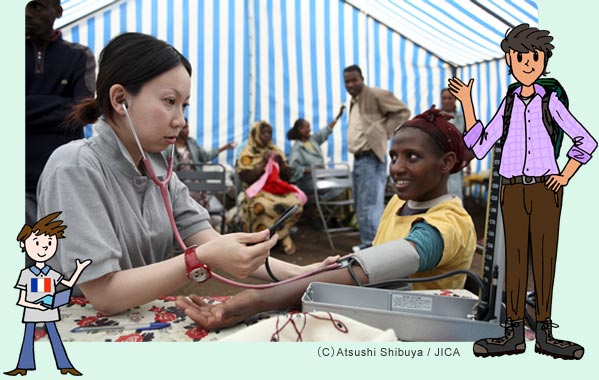

HIV/AIDS, tuberculosis, and malaria are known as the three major infectious diseases of the world; together they cause the deaths of 6 million people each year. Combating infectious diseases with high mortality rates like these is among the greatest challenges facing the world.
Raising Awareness Through Music
Amid this struggle, one Japanese man is using music to appeal for HIV/AIDS prevention in Africa, where the impact of the disease has been especially severe. In 2003, Kohei Yamada went to the southeast African country of Malawi as a member of the Japan Overseas Cooperation Volunteers, a program sponsored by the Japan International Cooperation Agency (JICA). During his two years in the country he came face to face with the devastation wrought by HIV/AIDS, and he resolved to use music as a means of communicating to young Malawians the importance of getting tested for the disease.
He enlisted the help of a popular Malawian musician, and in 2005 they completed "Ndimakukonda" (I Love You), an upbeat song sung in the native Chichewa language. They sought to raise awareness with the song's message: We should get tested because we love each other.
Although the song wasn't initially released on CD, it became popular after its appearance on TV and radio. It even went to number one on the Malawian music chart and was nominated for Malawi's version of a Grammy award. In 2006 a CD of the song went on sale in Japan, with a portion of the sales proceeds going toward construction of an HIV testing center in Malawi.

Fighting Tuberculosis and Malaria
Yamada later completed a Swahili version of the song and continues to participate in HIV/AIDS prevention activities, such as planning Friendship Cycling, an African bicycle tour to promote HIV/AIDS awareness.
Meanwhile, the Japanese Government is also working energetically to fight the global spread of infectious diseases. In 2002 the Global Fund to Fight HIV/AIDS, Tuberculosis, and Malaria was established after Japan raised infectious diseases as one of the main topics at the Kyushu-Okinawa Summit in 2000. Since its establishment, the Government of Japan has provided financial contributions to the Global Fund totaling $846 million and recently announced a new pledge of $560 million for the coming years starting in 2009.
Japan has particular experience with tuberculosis (TB), which was a major health issue in Japan until about 50 years ago. Because of its wealth of expertise in dealing with the disease, expectations that Japanese assistance will reduce the morbidity and mortality rate are high. This is why Japan is contributing technical and financial assistance to a large number of countries in need.
For example, in 1999 Japan collaborated with the Tuberculosis Control Project in Cambodia, a country where TB is still widespread. Assistance provided by the Japanese Government has allowed Cambodia to build a National Tuberculosis Center, which has resulted in high treatment success rates.










